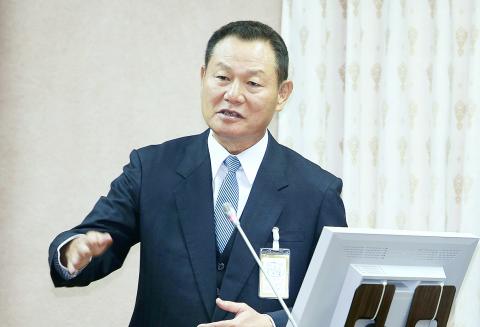A National Security Bureau (NSB) plan to establish a new department for cybersecurity in the coming months has received wide support among legislators, but some expressed concerns about security over recruiting “hackers” to work in government offices.
Bureau Director-General Lee Shying-jow (李翔宙) confirmed during a legislative session on Thursday that preparations are under way to recruit computer professionals from the private sector to staff the new cybersecurity unit, which is scheduled to start operating on May 1.
The new unit is to be designated the 7th Department (第七處) of the NSB and will have four working divisions: general services; research and development; countercyberattack; and network system defense.

Photo: CNA
The establishment of the new department represents the largest restructuring the bureau has undergone in two decades, and is seen as an important policy initiative and personal accomplishment of the current bureau chief.
The bureau, which is in charge of national security and intelligence affairs, was established in 1954 as an outgrowth of a division within the Department of Special Affairs in the Presidential Office.
After the lifting of martial law, the bureau’s mandate and organization with six major departments were set out in the Organization Act for the National Security Bureau (國家安全局組織法) of 1994.
Democratic Progressive Party Legislator Tsai Huang-liang (蔡煌瑯) questioned the inherent risks of employing “hackers” to conduct cyberwarfare missions, saying they might pose a threat to national security.
Lee disagreed on the use of the term “hackers,” saying they are “cybersecurity experts.”
“They have already performed some assigned tasks and have done very well. So, we are looking to amend the laws regulating information and communications to fully utilize their talents within the bureau’s framework, without infringing on national security,” Lee said.
Most legislators backed the plan and endorsed a proposal to increase the bureau’s budget and expand its mandate.
Some suggested that Lee recruit members of Taiwanese youth teams who have won top places in international hacking competitions.
However, some lawmakers expressed misgivings about whether these individuals would fit in in a government setting where rules and restrictions abound.
“These skillful computer professionals are highly creative, but they are unrestrained in their ideas and habits,” Chinese Nationalist Party (KMT) Legislator Lin Yu-fang (林郁方) said. “It would be difficult to properly manage them, which might lead to national security problems.”
“Our government agencies operate with a conservative mindset and in a highly restricted environment,” Tsai said. “It is unlikely that many young netizens and hackers would want to join the 7th Department.”
The bureau currently comprises six major departments, along with an Internal Security Department, a center for information collection and a Special Service Center for the personal protection of the president, vice president and their families.
The six departments are: international intelligence; intelligence operations focused on China; domestic security intelligence; analysis of national strategic intelligence; science and technology intelligence, and communication security; and research and development, and sections for deciphering and cipher code equipment.

A car bomb killed a senior Russian general in southern Moscow yesterday morning, the latest high-profile army figure to be blown up in a blast that came just hours after Russian and Ukrainian delegates held separate talks in Miami on a plan to end the war. Kyiv has not commented on the incident, but Russian investigators said they were probing whether the blast was “linked” to “Ukrainian special forces.” The attack was similar to other assassinations of generals and pro-war figures that have either been claimed, or are widely believed to have been orchestrated, by Ukraine. Russian Lieutenant General Fanil Sarvarov, 56, head

SAFETY FIRST: Double the number of police were deployed at the Taipei Marathon, while other cities released plans to bolster public event safety Authorities across Taiwan have stepped up security measures ahead of Christmas and New Year events, following a knife and smoke bomb attack in Taipei on Friday that left four people dead and 11 injured. In a bid to prevent potential copycat incidents, police deployments have been expanded for large gatherings, transport hubs, and other crowded public spaces, according to official statements from police and city authorities. Taipei Mayor Chiang Wan-an (蔣萬安) said the city has “comprehensively raised security readiness” in crowded areas, increased police deployments with armed officers, and intensified patrols during weekends and nighttime hours. For large-scale events, security checkpoints and explosives

PUBLIC SAFETY: The premier said that security would be tightened in transport hubs, while President Lai commended the public for their bravery The government is to deploy more police, including rapid response units, in crowded public areas to ensure a swift response to any threats, President William Lai (賴清德) said yesterday after a knife attack killed three people and injured 11 in Taipei the previous day. Lai made the remarks following a briefing by the National Police Agency on the progress of the investigation, saying that the attack underscored the importance of cooperation in public security between the central and local governments. The attack unfolded in the early evening on Friday around Taipei Main Station’s M7 exit and later near the Taipei MRT’s Zhongshan

REBUFFED: In response to Chinese criticism over recent arms sales, Washington urged Beijing to engage in meaningful dialogue instead of threats and intimidation Washington’s long-term commitment to Taiwan would not change, the US Department of State said yesterday, urging Beijing to stop pressuring Taiwan and engage in meaningful bilateral dialogues. The remarks came in response to a backlash from Beijing about Washington’s latest approval of arms sales to Taiwan. The US Defense Security Cooperation Agency said in a statement on Wednesday that the Taipei Economic and Cultural Representative Office in the US has asked to purchase an arms package, including Tactical Mission Network Software; AH-1W helicopter spare and repair parts; M109A7 self-propelled howitzers; HIMARS long range precision strike systems; tube-launched, optically tracked, wire-guided missiles; Javelin